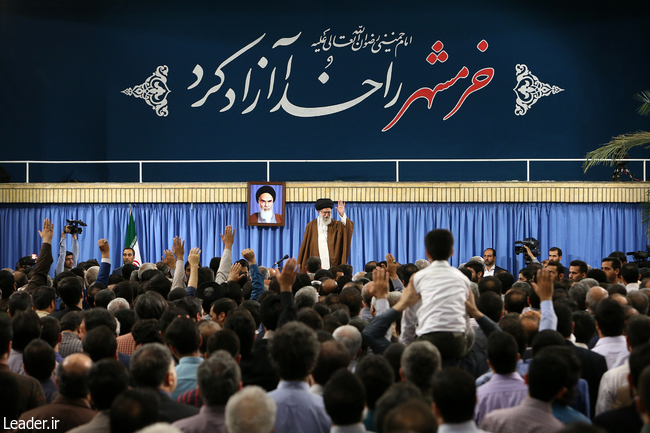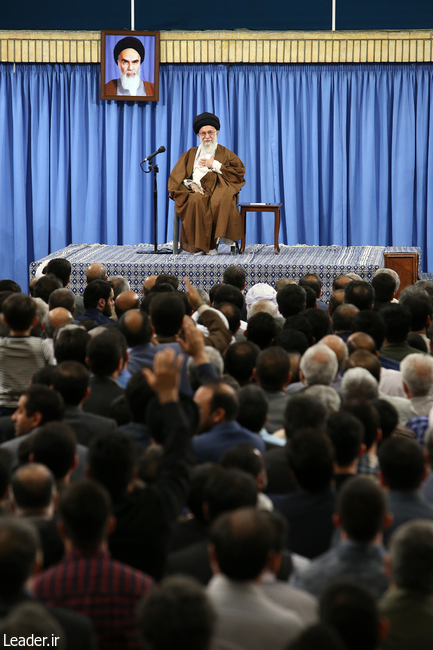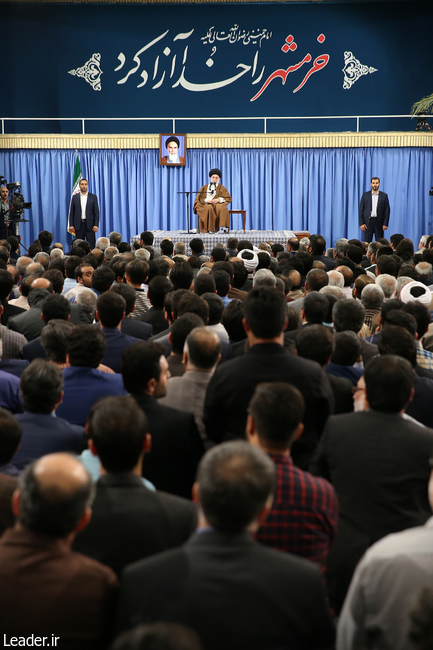In a meeting with a group of commanders, war veterans, artists and those involved in the production of events for the Sacred Defense memory recitation nights this afternoon (Wednesday), Leader of the Islamic Revolution Ayatollah Seyyed Ali Khamenei described as very valuable and important the recounting of the memories of the eight-year imposed war and the use of artistic, literary and modern means to convey them to the new generation, stressing, “One of the enduring lessons of the Sacred Defense era was that if trust in God is performed in practice with its endorsement coming from the bottom of hearts, it is certainly possible to overcome all of the obstacles and challenges faithfully.”
Highlighting the fact that the era of the Sacred Defense, besides the material and human losses, has highly significant effects for today and tomorrow, the Leader of the Islamic Revolution said, “The preservation and promotion of the revolutionary spirits in the society and the sustenance of the revolution is one of the effects of that era and had it not been for that struggle and sacrificial move, the revolutionary spirit would certainly have been exposed to threats.”
Stating one of the other effects of the Sacred Defense, Ayatollah Khamenei described that era as a scene for “trust in God,” “Not fearing powers” and “Prevailing over obstacles through this practical trust,” adding, “Any society moving toward progress naturally faces obstacles and challenges and if this society is in possession of spiritual aspirations that are against hunger for power and worldly matters, there will certainly be more obstacles, and in such a society practical trust in God and belief in the capability to overcome obstacles is very important.”
He reiterated, “The Islamic Republic can now claim victory over all of the challenges it faces, because it has the experience of prevailing over numerous and tough hurdles in the Sacred Defense era.”
The Leader of the Islamic Republic reiterated, “If the faith in hearts and trust in God exist in practice, even mountains would level out before such a resolve and will not have the capability to resist it.”
Pointing to the very tough conditions at the outset of the imposed war, Ayatollah Khamenei said, “From the second half of the [Persian calendar year] 1359 (1980) to early 1361 (1982), there were very difficult conditions in the arena of war and we were in the worst conditions in terms of military equipment and prepared and coherent armed forces and the Ba’athist enemy had stationed [its forces] ten kilometers from the [Iranian city of] Ahwaz.”
The Leader of the Islamic Revolution added, “However, through trust in great God and recognition of and reliance upon their powers and capabilities, commanders and warriors succeeded in reversing the situation and in early 1361 (1982), the two major operations of Fat’h ul-Mobin and Beit ul-Muqaddas were carried out, the result of which was taking thousands of Ba’athist aggressors captive and recapturing a vast area of [our] land and the liberation of Khorramshahr.”
Pointing to the fact that all world powers, including the US, NATO, former Soviet Union and regional reactionaries were standing against the Islamic Republic, he added, “We succeeded in overcoming these powers in such conditions. Aren’t these practical experiences sufficient for our assurance and peace of heart?”
Pointing to a verse of the Holy Quran which calls on us not to allow despair and lethargy into our hearts, the Leader of the Islamic Revolution stressed, “If we have genuine faith in God and trust in Him, we can overcome all difficulties and challenges faithfully.”
Stating that the promotion of this spirit and practical trust will be possible through holding dear the memories of the Sacred Defense era, Ayatollah Khamenei said, “The books that have been written about the memories of the Sacred Defense or the movies that have been made on this issue transcend a mere artistic or literary work and these works are, in fact, the injection of cement into the pillars of the revolution and national identity and the country’s progress so that these foundations are made more solid and enduring.”
The Leader described the memories of the Sacred Defense era as a national asset and stressed the need for continuing to collect these memories and using captivating artistic approaches to pass them on to the new generation and refraining from exaggeration in stating them, adding, “Imparting these memories to the society is a charitable and virtuous undertaking and a great spiritual donation and those who are active in this field are, in fact, intermediaries for the provision of spiritual and divine aliment to the country.”
Leader of the Islamic Revolution described the tours of the Sacred Defense battlefields, known as Rahiyan-e Nour, as among these charities and virtuosities and pointed to the existence of motivations for undermining the works and lessons of the Sacred Defense era, reiterating, “The same motivations that push the Islamic countries to eliminate the issues of Jihad and martyrdom from study books also extend inside [the country] and manifest themselves in the form of macro-cultural policies.”
Ayatollah Khamenei stressed that there should be no negligence whatsoever, saying, “The Sacred Defense, struggle and martyrdom must be kept alive so that today’s generation joins the same generation that created the heyday of Sacred Defense history.”
The Leader described the adhesion of today’s generation to the generation of the Sacred Defense era as the attachment of this generation to the righteous, adding, “Just like in the 1360s (1980s), today I can see youths who seek to participate in the arena of defending the shrine [in Syria] with tears and persistence and the transferring of the spirit and values of the Sacred Defense era to today’s generation is the result of the efforts and struggles of structures who work to pass on the memories of that era.”
Stating that the memories of the era of Sacred Defense are replete with morals and reason, the Leader of the Islamic Revolution said, “Even if efforts are made for the next fifty years to collect the truths, memories and treasures of that era, we still won’t reach its end.”
At the beginning of this meeting, misters:
• Morteza Sarhangi – the office manager of the resistance literature of the Arts Department
• Abolfazl Kazemi – the author of “Koocheye Naqashha” (The Painters’ Alley)
• Asghar Naqizadeh – war veteran and Sacred Defense movies actor
• Mehdi Tahanian – war veteran and the narrator of the book “Sarbaz-e Koochak-e Imam” (Imam’s Little Soldier)
• Masha’allah Shahmoradi – war veteran and director for “Rojan” TV series
• Mamousta Molla Qader Qaderi – The Friday Prayers’ leader of the town of Paveh
• Ali Khoshlafz – war veteran and the narrator of the book “Vaqti Mahtab Gom Shod” (When the Moonlight Went Missing)
• Alireza Moradi – retired army colonel
• Ebrahim Hatami-Kia – director of Sacred Defense movies
• And Ms. Maryam Katebi – an aid worker in the Sacred Defense era and a comrade of missing commander, Ahmad Motevasselian
recited memories of the exploits and epic-creating deeds of the warriors and war veterans.
Also in the ceremony, the youths of the “Nasim-e-Qadr” vocal group performed the song “Arghavan” (Violet) on the Defenders of the Shrine volunteers active in Syria.



